
Diagnostic radiology vs. psychiatry is one of the biggest debates among medical students interested in physiology. Both specialties allow you to explore the complex workings of the human body and use your skills to improve patient outcomes. However, they also have significant differences, such as the scope of practice, the work environment, and the training requirements.
How do you decide which one is right for you? In this article, we will provide helpful information and tips to help you make an intelligent decision on diagnostic radiology vs. psychiatry and find a fulfilling career that matches your interests and abilities. We will also help you evaluate practical factors such as job availability, salary, and training duration.
Diagnostic Radiology vs. Psychiatry: Salary and Job Security
Diagnostic radiology might be your specialty if you want to earn a lot of money and have a steady demand for your services. But be prepared for a competitive job market, even if you graduate from a prestigious program.
There are many job openings in the field of diagnostic radiology. Hospitals are often in high demand for radiologists, and the career outlook is positive. Similarly, the job outlook for psychiatry is positive. There is expected to be a high demand for psychiatry in the future due to a significant shortage of psychiatrists, which will lead to strong job security.
According to recent data, radiologists earn an average annual salary of $483,000, while psychiatrists have a lower average salary of $309,000.
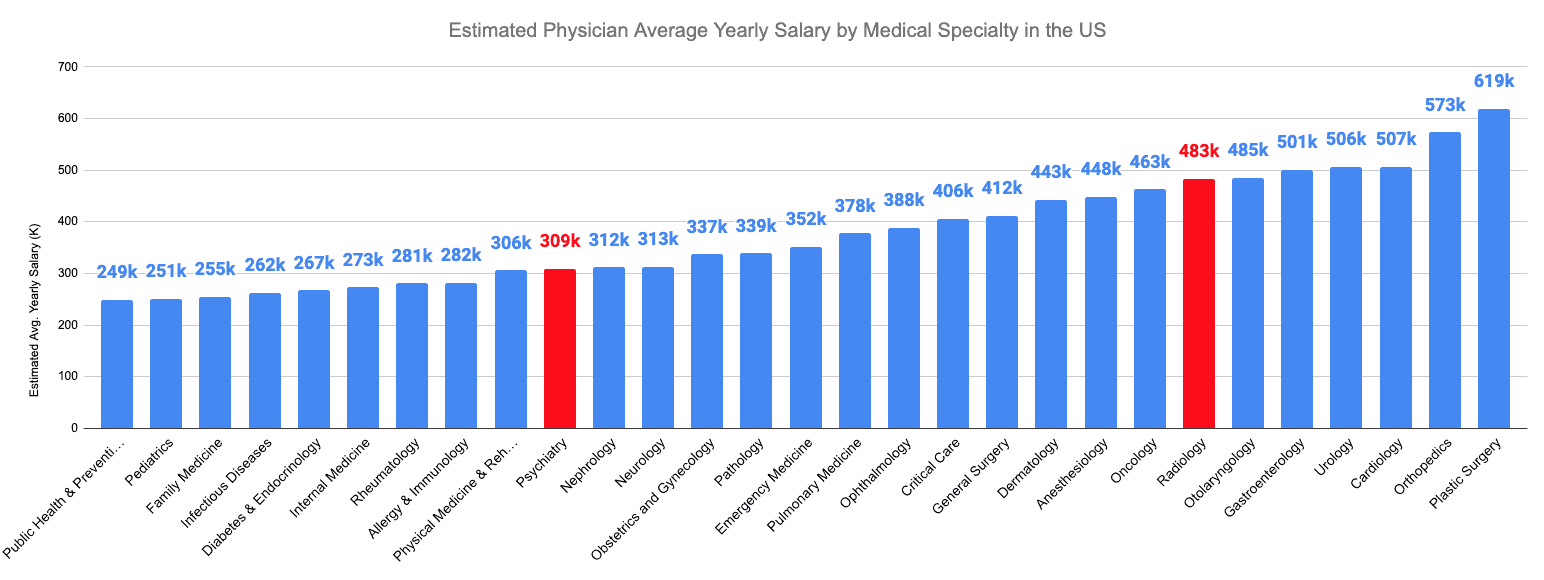
Radiologists earn $483,000 per year on average, while psychiatrists earn less with $309,000 annually
Diagnostic Radiology vs. Psychiatry: Competitiveness
Here we can assess the competitiveness of a specialty by looking at the unmatched rate – the % of people who apply and do not match into their preferred specialty. The unmatched percentage among US Seniors for psychiatry was 7.8%, making it less competitive among US residencies. In comparison, diagnostic radiology had a higher percentage at 16.8%, making it a more competitive residency.
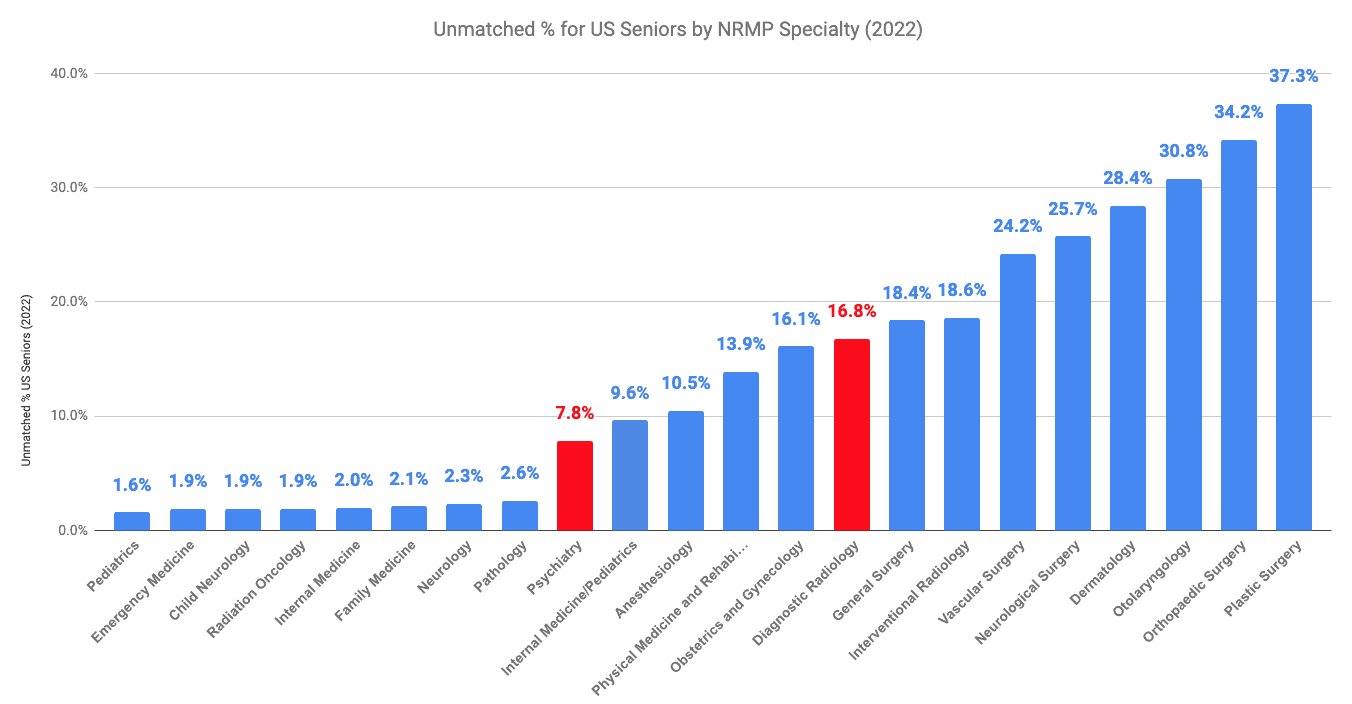
Diagnostic radiology had a 16.8% unmatched rate, while psychiatry had a 7.8% unmatched rate among US seniors
Training Path: Residency
The training pathways for diagnostic radiology vs. psychiatry are not the same. Psychiatry involves a four-year psychiatry residency. Diagnostic radiology involves a five-year radiology residency.
Psychiatry residencies are typically less competitive than diagnostic radiology residencies. Your USMLE scores, med school, and research are the main things for residency applications. Research is also a big thing for fellowship applications, and your residency program counts more, but your USMLE scores matter much less.
Diagnostic Radiology vs. Psychiatry: Work-Life Balance
Work-life balance is a crucial factor for many medical professionals. Both diagnostic radiology and psychiatry offer a better work-life balance than surgical specialties. Radiologists may have the flexibility to work remotely, allowing for a slightly better work-life balance. Similarly, psychiatrists have predetermined working hours that lead to predictable schedules, but may also have on-call duties and emergency consultations.
On average, radiologists work 49.6 hours per week, ranking below the middle of all medical specialties. In comparison, psychiatrists average 46.6 weekly working hours, ranking near the lower end.
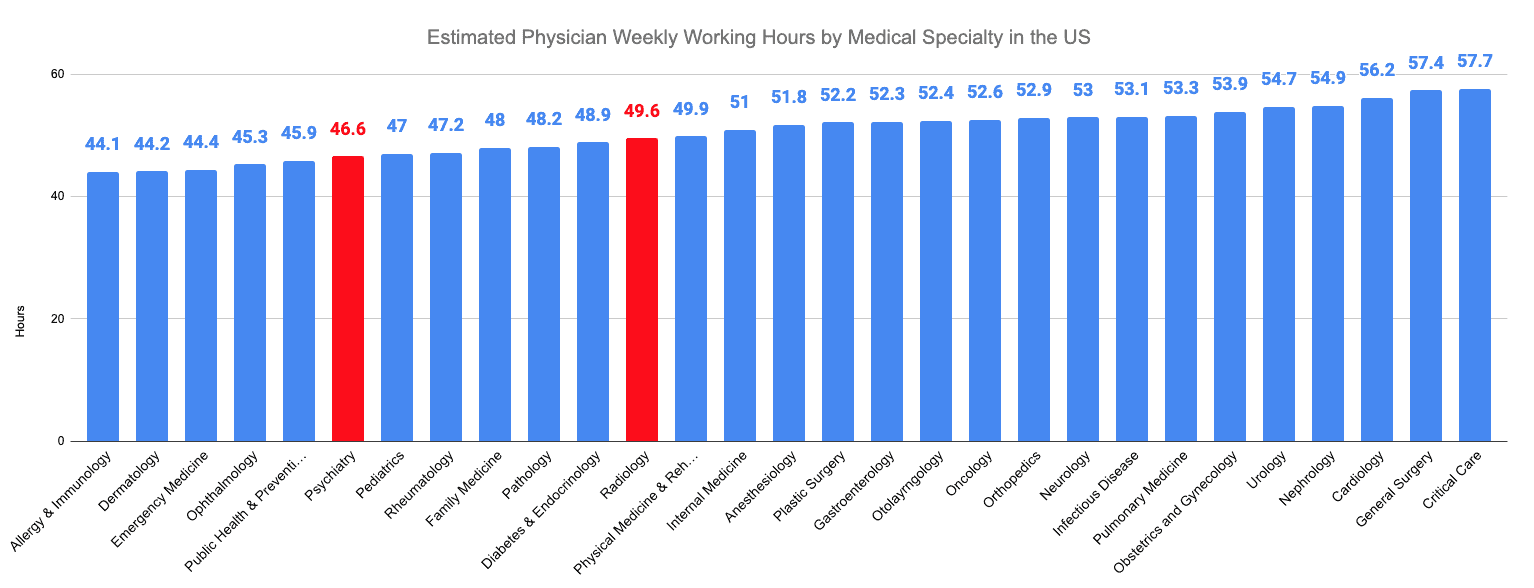
Radiologists work an average of 49.6 hours per week, while psychiatrists work fewer hours, at 46.6 per week
Radiologists require less documentation, such as referral letters, resulting in an estimated 11 hours of admin/paperwork per week. In comparison, psychiatrists spend more hours with 16 hours per week, ranking above the middle.
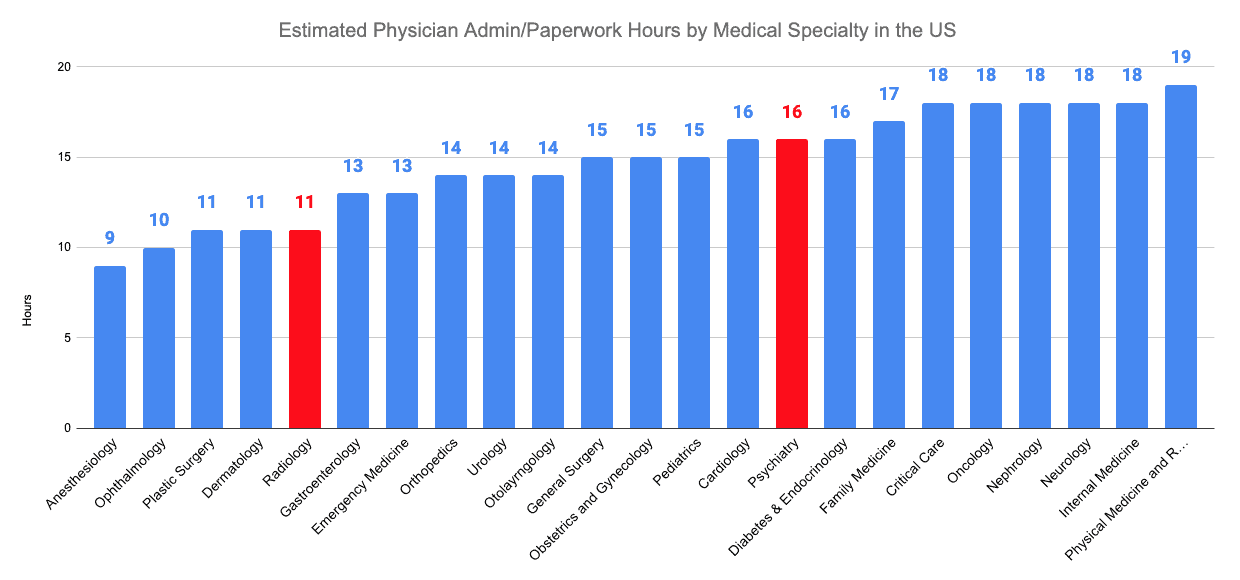
Radiologists work on admin/paperwork an average of 11 hours per week, while psychiatrists work more hours, at 16 per week
Training Duration and Subspecialties
The training duration is a key aspect to consider when choosing between diagnostic radiology vs. psychiatry. Psychiatry has a four-year training period, while diagnostic radiology has a minimum of five years of diagnostic radiology residency.
After completing a diagnostic radiology residency program, some radiologists may choose to pursue additional fellowships to further specialize in a particular aspect of diagnostic radiology, such as interventional radiology or musculoskeletal imaging. This can increase the length of their diagnostic radiology training.
Diagnostic Radiology vs. Psychiatry: Job Satisfaction and Burnout Rates
Job satisfaction plays a significant role in career fulfillment. According to various studies, diagnostic radiology tends to have higher job satisfaction rates than psychiatry. Many radiologists express contentment with their career choice and would choose it again if given the chance. However, psychiatry has a lower reported burnout rate than diagnostic radiology.
According to recent data, diagnostic radiology ranked near the upper end of all medical specialties with 90% of radiologists stating that they would choose the same specialty again, while psychiatry ranked lower with 84% of psychiatrists feeling the same way.
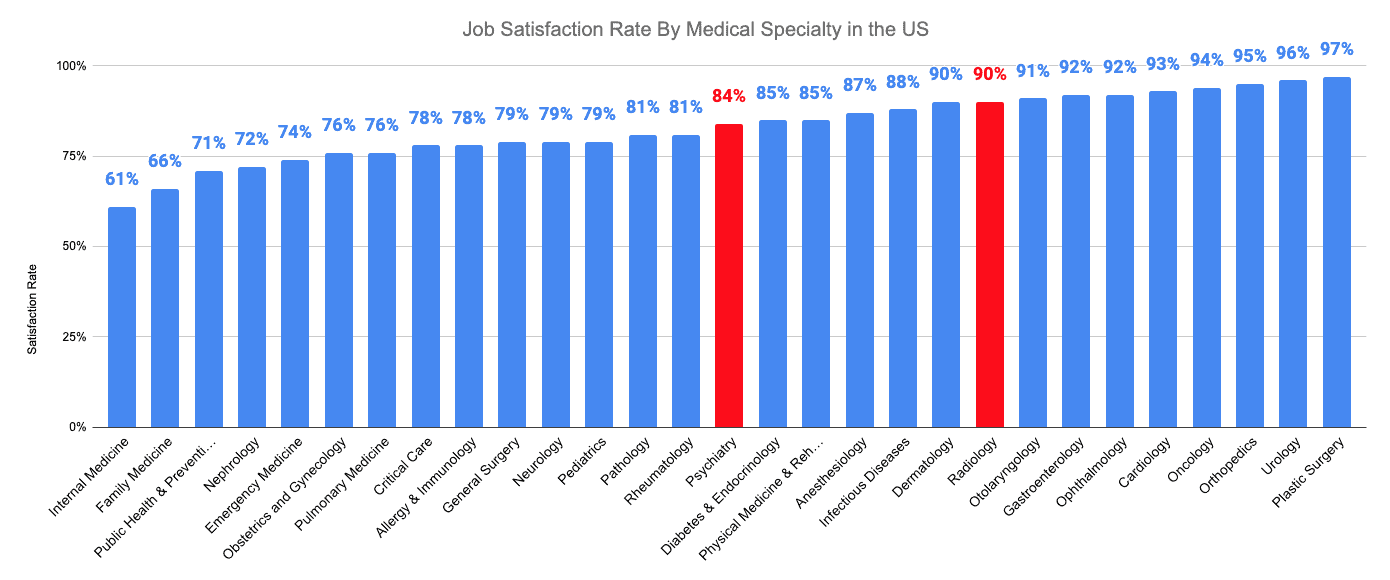
Radiologists reported a 90% job satisfaction rate, while psychiatrists reported lower satisfaction with 84%
The burnout rate for diagnostic radiology was above the middle of all medical specialties, at 54%, while the burnout rate for psychiatry was near the lower end at 47%.
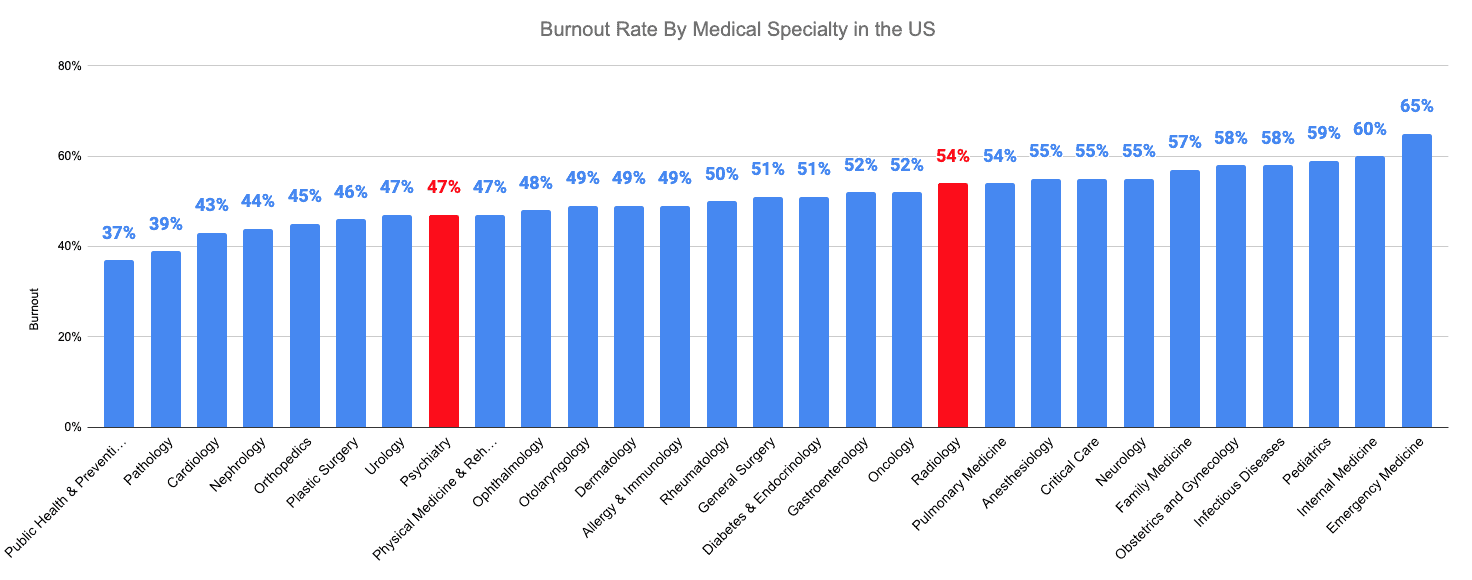
Radiologists have a burnout rate of 54%, while psychiatrists have a lower burnout rate of 47%.
Diagnostic Radiology vs. Psychiatry Comparison
To provide a visual overview, here’s a table comparing diagnostic radiology and psychiatry:
| Aspect | Diagnostic Radiology | Psychiatry |
|---|---|---|
| Average Salary | Generally high income | Lower than radiology |
| Job Security | High demand due to importance of imaging in diagnosis and nonsurgical treatments | High demand due to the prevalence of mental health conditions |
| Training Path | Typically involves 5 years of radiology residency | Typically involves 4 years of psychiatry residency |
| Lifestyle | Better work-life balance, no take-home work | Typically more regular working hours, but may also have on-call duties and emergency consultations |
| Administrative Paperwork | Low documentation requirements | Higher documentation requirements such as notes and referrals. |
| Job Satisfaction | High | Lower |
| Burnout Rates | Moderate | Low |
| Personality | Analytical, technology-oriented, ability to multitask | Strong communication and empathy skills, ability to handle delicate and sensitive situations |
Please note that this table serves as a general comparison. To determine the most suitable career for you, consider your personal and career priorities and goals.
Concluding Thoughts
Choosing the right specialty between diagnostic radiology vs. psychiatry depends heavily on your priorities. To determine this, try reverse engineering your ideal life and identify your top priority. A helpful exercise is to write down the top five things you want to achieve in your career and personal life. Knowing these priorities will make finding a career that aligns with them easier. Often, the biggest obstacle is not a lack of knowledge about different fields but a lack of self-awareness about our own preferences.







